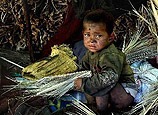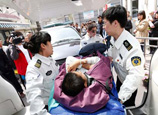
Just last month, a terror attack took place in Selibuya township, in southern Xinjiang's Kashgar prefecture. Nine community workers and six policemen (10 Uygurs, three Han and two Mongolians) were killed. Six suspects were shot dead and eight were arrested. The police investigation showed that the group was planning an even bigger attack this summer.
The attack on April 23 was the deadliest incident since the July 5 riot in 2009 in Urumqi, capital of the region, which left about 200 dead.
Police later arrested 11 suspects who had fled the scene. They found 20 explosive devices, raw materials for making explosives, knives, combat training equipment, illegal religious materials as well as three jihadist flags.
The region has also tried to eliminate illegal religious activities and thoughts of extreme religions while protecting people's right of religious freedom.
"The focus is on seizing illegal publications and the distribution of illegal religious information," he said.
Zhang said the key to solving Xinjiang's problem is development, and its priority is to improve people's livelihood. About 70 percent of the region's annual public finance expenditure went to projects to improve people's living standards three years in a row.
During the conference in 2010, the central government put forward Xinjiang's development goals and tasks over the next five to 10 years, providing policy support from the central government and construction project assistance from corresponding provinces and municipalities across the country. The GDP of the region has grown from 427.7 billion yuan ($68.98 billion) in 2009 to 750 billion yuan in 2012.

















 Deaths prompt concerns over elevator safety
Deaths prompt concerns over elevator safety


![]()
